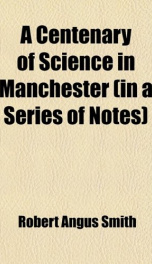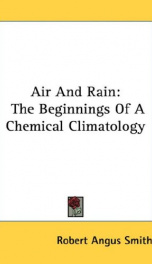a centenary of science in manchester in a series of notes

Purchase of this book includes free trial access to www.million-books.com where you can read more than a million books for free. This is an OCR edition with typos. Excerpt from book: CHAPTER III. DR. PERCIVAL. WHEN Warrington was making this bold attempt to rise, Manchester was really beginning to be important. Active minds grew in it, and far-sighted men flocked there, attracted by its decided advance just before the seventh decade of last century. Lookers on previously did not see which Lancashire city was destined to the most rapid increase; some had believed the most promising to be Liverpool, others Ormskirk, but an influential class evidently supposed it to be Warrington; and there the notable but short-lived academy was established. The men who taught and those who learned were scattered, but not before some of the spirit had passed on to Manchester, and especially in the person of Dr. Percival, who had decided, after a very full medical education in Edinburgh, London, Leyden, and Paris, to begin practice in this town. He seems to have been a singularly pleasant man, and one wonders what sort of people his ancestors were at Thelwall near Warrington, when his grandfather left the old family house and chose no longer to help the inmates to farm their own ground. We have few dates, but this must have been about 1670 or sooner. He (the grandfather) studied medicine, and returned to practise at Warrington; his name was Peter Percival, and he died in 1701. MarthaWorsley, his wife, was said to have been a woman of great talent; her sister, Mrs. Mather, is better known on account of her theological correspondence with Bishop Burnet. There was talent therefore on both sides. The eldest of four sons became also a physician, and studied in Leyden, and we feel interested in thinking of him studying under Boerhaave, and learning from the lectures that animal heat was produced by the friction of the blood moving in the veins. This is a link of our society with ...
Info about the book
Author:
Series:
Unknown
ISBN:
0826416349
Rating:
5/5 (1)Your rating:
0/5
Languge:
English
Users who have this book
Users who want this book
What readers are saying
What do you think? Write your own comment on this book!
write a commentif you like a centenary of science in manchester in a series of notes try:
Other books by this author
Do you want to exchange books? It’s EASY!
Get registered and find other users who want to give their favourite books to good hands!



